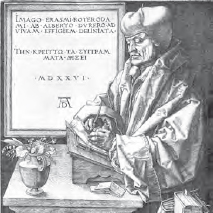Neoplatonism Through the RenaissanceRenaissance Humanism |
What was philosophical about the thought of Desiderius Erasmus? |
Desiderius Erasmus (1466–1536) was born in Holland as the illegitimate son of a priest. He became widely known and highly respected throughout England and Europe for his biblical translations and ideas about religion. He was one of the first thinkers after antiquity to admit to skepticism in religious debates. His Moride Encomium (In Praise of Folly) reintroduced the idea of a simple, pious Christianity. However, when Martin Luther (1483–1546) tried to enlist his support in the Protestant Reformation he resisted taking his side. When Luther criticized him for this, Erasmus responded with On Free Will in which he argued that it was impossible to know, as Luther claimed to know, that man did not have free will.
Erasmus was not himself a philosopher, but he made fun of the preoccupations of the scholastics and inaugurated their subsequent reputation as intellectually trivial. Through his influence in Europe on its educational systems, Greek, Latin, and Hebrew became more widely taught. Overall, he was a great supporter of the kind of critical spirit that many scholars believe eventually produced the Enlightenment.

